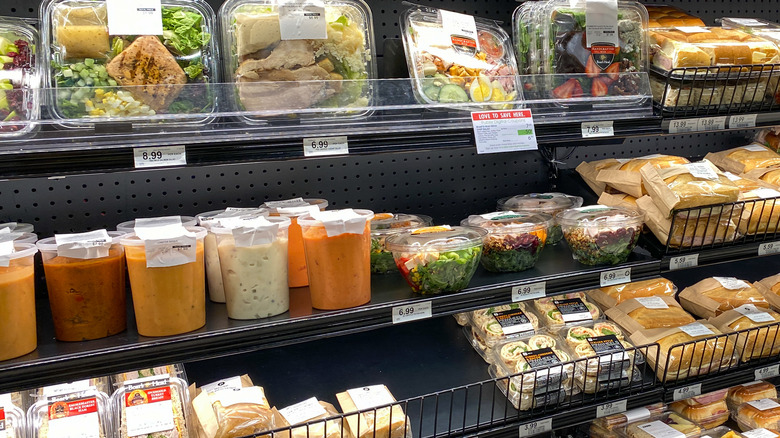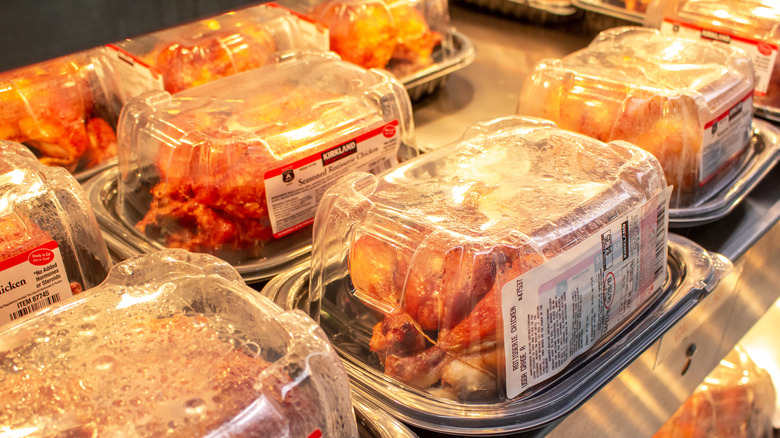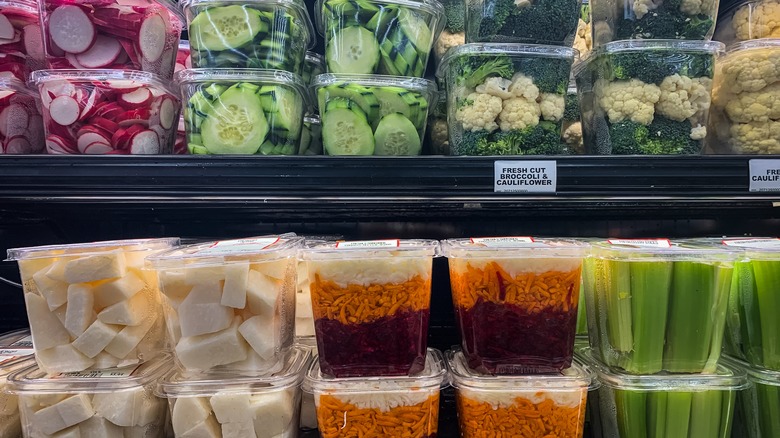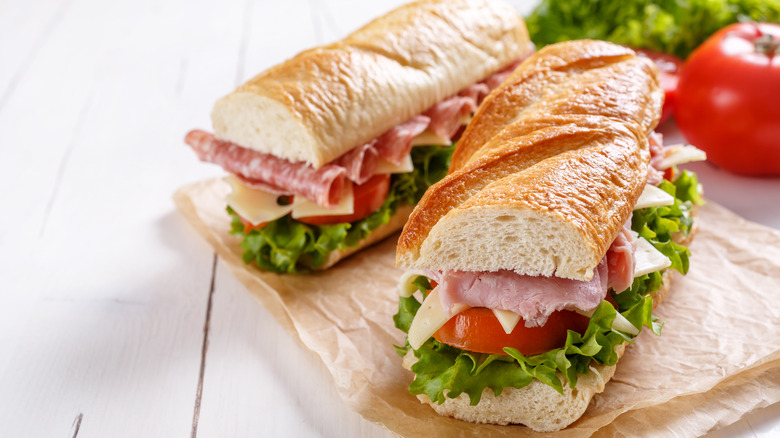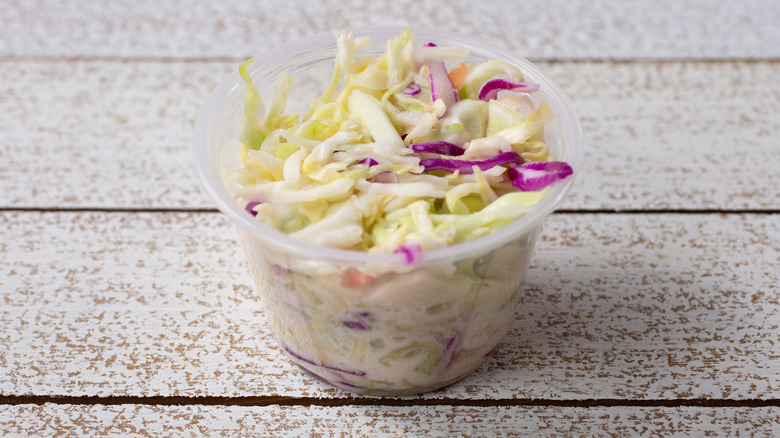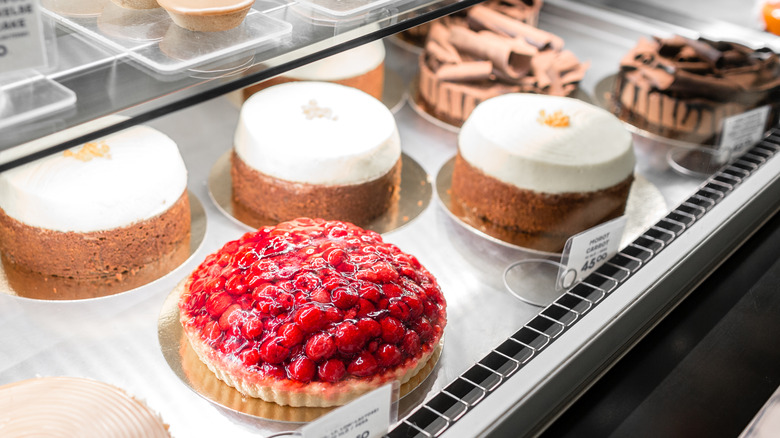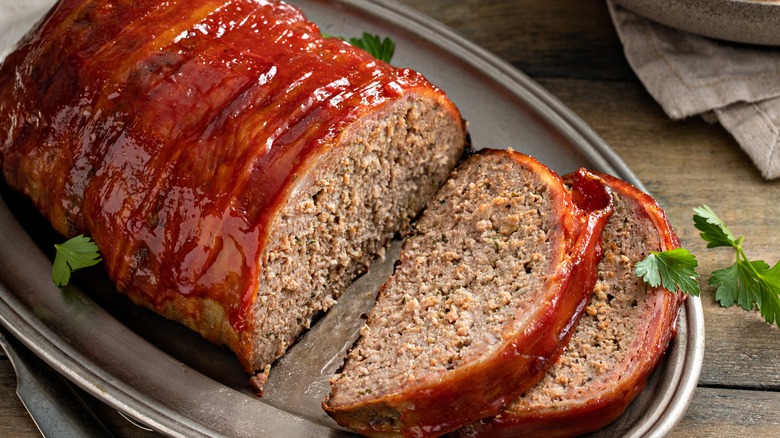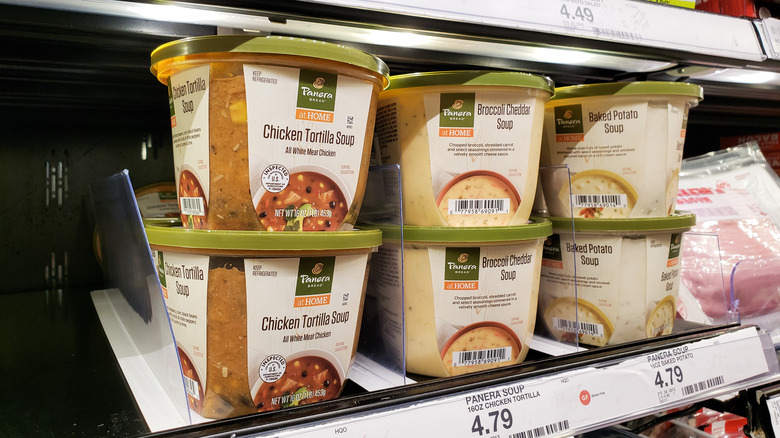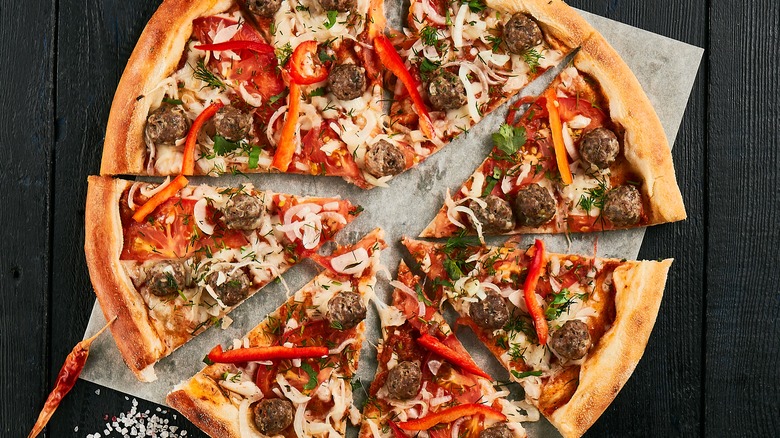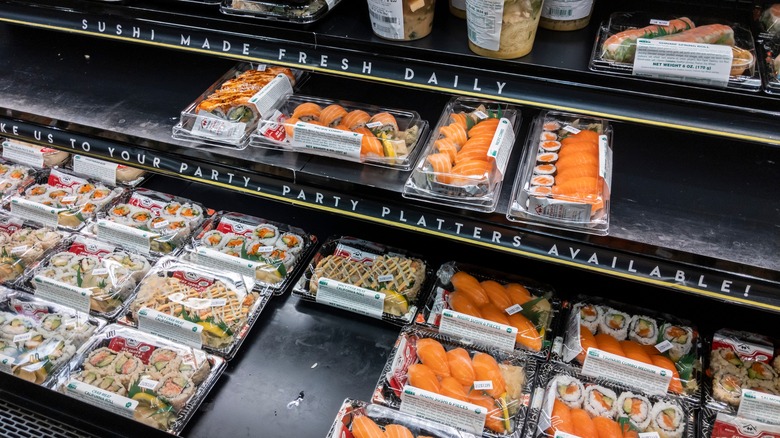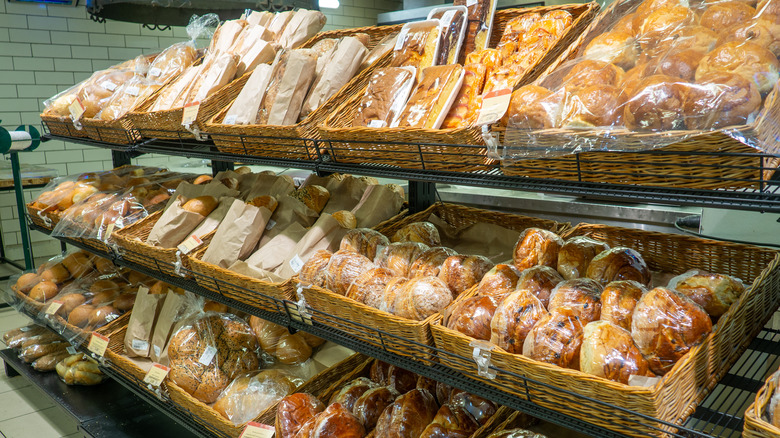11 Prepared Foods You Should And Shouldn't Buy At The Grocery Store
Prepared foods can be a time saver. They're handy if you don't feel like cooking, or if certain foods are too complicated or time-consuming to make at home.
Still, sometimes prepared foods get a bad rap, with convenience foods being called pricey compared to homemade meals. But many consumers are willing to pay extra for prepared items — according to a survey by Pymnts, it's a growing grocery category. Their recent survey of nearly 2,700 U.S. consumers shows 37% purchased prepared food while grocery shopping, up from 30% in November 2021.
Buying pre-made meals is easy these days. You can find everything from salad and fruit, to rotisserie chicken, bakery items, smoothies, sushi, and more. But just because they're available doesn't mean they're necessarily a good option. Some prepared foods are great choices to help you save time and energy, but there are others that you might want to avoid.
Buy: A rotisserie chicken at Costco
Rotisserie chicken is one of the best prepared foods you can buy at the grocery store. Here's why: It's already cooked and ready to eat, it's affordable, and it's the star ingredient in a lot of dishes.
The best value for a rotisserie chicken is Costco. The membership warehouse has been selling rotisserie chickens for $4.99 since 2009 and they're committed to that price point — even during inflation — because the store can make back its money on other higher-priced items (via CNN).
A rotisserie chicken from Costco is such a good price that Consumer Reports says it's actually cheaper to buy the chicken already made than to purchase an uncooked chicken and prepare it yourself. According to Reader's Digest, in 2021, the retailer sold 106 million rotisserie chickens, a new record.
You can make a variety of entrees with your rotisserie chicken, including tacos, casseroles, sandwiches, salads, and more. You can also just eat it right out of the container.
Don't buy: Pre-cut fruits and veggies
There are a few things to consider the next time you're thinking about buying bagged produce like spinach and salads, and containers of pre-cut fruits like pineapple, berries, and melon.
Cleveland Clinic advises consumers to check expiration dates and to buy the one with the farthest date from the time of purchase, noting that pre-cut veggies start losing their freshness around five days. Get bagged or chopped vegetables that don't look dry, as lack of moisture could mean they've lost their freshness and some of their nutrients.
Buy pre-cut produce that's stored in the refrigerated section and chilled at approximately 39 degrees F. If it looks slimy, toss it out. Too much water in the product or a lackluster look could mean it's going bad.
If you do buy pre-cut produce like bagged lettuce or chopped celery, make sure you wash them first, even if they say pre-washed. Washing them removes any chemicals used during packaging.
But even if you wash produce, prepackaged or not, you could still get sick. For example, a bagged salad was recalled in April of 2022 for listeria, which was linked to three deaths and 16 hospitalizations (via Centers for Disease Control and Prevention). If you're concerned about contamination, cooking your veggies is the best way to avoid germs.
Buy: Deli sandwiches
Sandwiches are an easy meal and they're portable, but sometimes you don't want to make your own or you're too busy to prepare one. If you're craving a good sandwich, this is the perfect item to buy prepared. And buying a deli sandwich at the grocery store can be both convenient and delicious.
Now if you're thinking, "Why would I buy a sandwich at the grocery store?" Think again. Supermarkets often have amazing options at great prices.
In a Mashed survey of 646 American consumers, voters ranked the top grocery store deli as Kroger at 33%, followed by Costco at 23%, and Walmart at 14%, with Aldi, Meijer, H.E.B., and Target all coming in with less than 10% each.
Kroger carries a lot of premium meats and cheese, including Boar's Head turkey breast, pastrami, and chicken breast, and cheeses like Swiss, provolone, and cheddar. Getting hungry for a grocery store sub or wrap yet? We are!
Don't buy: Coleslaw
Coleslaw – made of shredded cabbage, carrots, mayonnaise, and vinegar — is a staple of a summer picnic. But if the side dish sits around the grocery store too long, it may get slimy. Typically, you'll find coleslaw at the deli counter, where it's sold by the pound, or in refrigerated plastic containers.
But how can you tell if the coleslaw has been sitting around too long? Cully's Kitchen says pre-made coleslaw only last three to five days, which is why it's important to check the expiration date. Don't buy it if it looks watery, if it has a bad smell, or if the color looks off. In the last decade, there have been at least three recalls of coleslaw due to salmonella and listeria concerns, one as recent as 2019 (via Food Safety News).
If you want to avoid worrying about whether or not that grocery store coleslaw is safe to eat, try whipping up a creamy coleslaw at home with this recipe that only takes five minutes to prepare.
Buy: Cake
Whether you need a cake for a special occasion or simply want to indulge your sweet tooth, the grocery store is a great place to get pre-made cakes.
The Grocery Store Guy says cakes from Whole Foods are his favorite store-bought option, explaining these baked goods use real buttercream, taste homemade, and don't have artificial sweeteners.
While Walmart cakes are budget-friendly, The Grocery Store Guy finds that they're often too sweet. Plus, the food coloring in the frosting can stain (at least temporarily) your teeth, skin, or clothes. Costco cakes are good value for your money. While their styles and flavors are limited, they're still a great option if you have to feed a crowd.
If your supermarket cake looks too basic, follow the social media trend of giving your grocery store cake a makeover. That typically involves removing all of the frosting and replacing it with your own, adding another cake on top for a second tier, and creating sophisticated designs, like the ones seen in this transformation on TikTok.
Don't buy: Pre-packed meatloaf
Meatloaf is definitely a tasty comfort food, but that doesn't mean it's good for you.
One serving of Walmart's prepackaged Marketside Meatloaf (the package contains three servings) has 350 calories, 26 grams of fat, 10 grams of saturated fat, and 700 mg of sodium (via Walmart.com). That's 50% of your suggested daily amount of saturated fat, and a third of your recommended daily salt intake.
The American Heart Association (AHA) warns that eating too much saturated fat can raise your cholesterol, which puts you at risk for heart disease. AHA also says over 70% of the sodium we consume comes from prepared, packaged, and restaurant foods, and that cutting back on sodium can decrease the likelihood of heart disease and lower your blood pressure.
Still, that doesn't mean all meatloaf is off-limits. Make your own meatloaf at home, without as much fat or sodium as found in prepared versions from the grocery store.
Buy: Soup
Get your favorite soup toppings — like crackers, croutons, hot sauce, cheese, and others — ready.
Whether you're into clam chowder, tomato bisque, broccoli and cheddar, potato, bean, or classic chicken noodle, there's something very appealing about pre-made soups found at the grocery store. Maybe it's because they're great comfort foods, or simply because they give you the chance to savor restaurant-quality soups at home. While it's true that many of these soups have added fat, calories, and sodium, that's not stopping consumers from adding them to their shopping carts.
Many grocery stores have their own brands of pre-made soup, as well as big brand-name alternatives. Panera's line of at-home soups is very popular. In a Mashed ranking of Panera's grocery store soups, top picks include the Greek-style lemon chicken soup; turkey, sausage, kale, and quinoa soup; Italian-style wedding soup; and Southwest corn chowder.
Pair your supermarket soup with a yummy sandwich, like these delicious versions of the classic grilled cheese.
Don't buy: Smoothies
Thinking of picking up a prepared smoothie for breakfast or lunch? It's not always a great option, especially if you're health-conscious, since these drinks could be loaded with sugar and added fat.
"Just because there's a leafy green in it doesn't make it low-calorie," Sarah B. Krieger, a registered dietitian nutritionist, told The New York Times. "There's a fine line between a smoothie and a milkshake."
For example, a large Jamba pb + banana protein (soy) smoothie has 700 calories, 33 grams of fat, 8 grams of saturated fat, and 40 grams of protein (via Jamba.com). That one drink provides more than half of a person's daily value for fat, 40% of recommended saturated fat, and 80% of the daily recommended amount of protein.
Instead of buying a prepared smoothie, make your own healthy and delicious concoction at home. Load your blender with fresh (and frozen) ingredients, from leafy greens and fruits to protein powders.
Buy: Pizza dough
If you're in the mood for homemade pizza but don't have time to make your own dough, head to the grocery store to pick up some pre-made dough.
Sure, you could make pizza at home, but to do it right, you would need "00" flour, which is called "doppio zero" flour in Italy. But most of all, you would need a lot of time, because homemade dough needs to proof before baking.This brings us once again to the grocery store, where you can pick up a bag of pizza dough that's ready to use. Plus, most 16-ounce bags of pizza dough cost under $3. That's a deal, especially when you want homemade-level dough without having to make it from scratch.
Trader Joe's plain pizza dough is the pre-made dough of choice for food writer and pizza cookbook author Jim Mumford, who told Mel Magazine, "Pizza isn't the only thing you should be making with store-bought pizza dough. Because you can make a lot of things with it, starting with a mouth-watering batch of cinnamon rolls for tomorrow's breakfast." Dinner and breakfast from store-bought pizza dough? Yes, please!
Supermarket sushi: Yay or nay?
If you are a sushi lover, picking up pre-made sushi at the grocery store is probably not your top choice. Is it safe? Probably. Still, many people are unsure about buying sushi at the same place where they pick up bread and orange juice.
Secrets of Sushi says the most important thing to do is check the date on your sushi to make sure it's fresh. Never buy sushi that is past its sell date. Make sure the sushi is refrigerated, but note that the downside of refrigerating sushi is that the seaweed can get soggy and the rice won't be as flavorful as it would be if it were made at a restaurant. Also, raw seafood loses its flavor when refrigerated — yet another reason why grocery store sushi isn't your best option.
Despite the drawbacks, many consumers love buying supermarket sushi, like California rolls and sashimi. In a survey by Mashed, nearly 47% of the 600+ participants in the survey chose Whole Foods as their favorite place to buy sushi, followed by Kroger, Costco, Walmart, Target, and Meijer. So while packaged sushi may not be the tastiest option, if you're craving a bite, there's nothing wrong with grabbing a box at the grocery store.
Buy: Fresh bread
If you buy bread baked at the grocery store, you're not the only one.
According to the Food Industry Association, in-store bakeries at groceries are doing well, up 7% since last year. 95% of shoppers report occasionally eating bakery items purchased at the grocery store, while 63% of shoppers say they buy from their in-store bakery every week.
For price, convenience, and availability, consider Walmart's French bread, which is a deal at under $2. Walmart's bakery is already well known for producing a lot of baked goods including cookies, muffins, and yes, bread, croissants, and rolls. Drivin' & Vibin' names Walmart as the best bakery, explaining it has great prices and good variety. But you may be surprised to know Walmart's breads aren't made in-house. They come from distributors and are often frozen and then baked in-store.
Many grocery stores have a guarantee of fresh bread during certain hours around dinnertime and we're all for it. Whether you pick up a loaf of French bread, Italian bread, ciabatta rolls, or another grocery bread item, in-store breads are a prepared food that we love. They're also incredibly versatile — eat them on their own or use them as a base for French toast, bruschetta, sandwiches, cheesy bread, and more.
